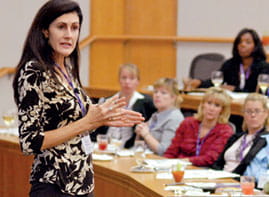10/6/2008 - Surveying the standing-room-only audience of Kellogg students who came to hear him speak on the topic of “Investing in Times of Crisis,” investment professional Brian Posner had a question.
“Are all of you running money in the markets,” asked the 1983 Northwestern University graduate, “or do you just want to see what the train wreck looks like for those who
are running money?”
 |
| Investment expert Brian Posner (NU ‘83) appeared with Ubben at an Oct. 2 Kellogg event to discuss recent economic issues. |
| Photo © Rich Foreman |
Against the backdrop of a plunging stock market, vanishing credit and a still-uncertain government bailout, Posner and Jeffrey Ubben shared their analysis of the financial crisis with several hundred Kellogg students at the Donald P. Jacobs Center on Oct.2.
Ubben ’87 is a founding member and managing partner of ValueAct Capital, a San Francisco-based hedge fund. Posner is director of biotech company Biogen Idec. Previously, he served as CEO and co-chief investment officer at ClearBridge Advisors LLC.
Friends since they worked as portfolio managers at Fidelity Investments in the late 1980s, Ubben and Posner have spent two decades managing billions of dollars in assets for major companies. Drawing lessons from that experience, they explained the origins of the current investment crisis and offered insights about the economic future.
The two agreed that over-leveraging, unrealistic expectations about profits and poor — or nonexistent — risk analysis led many investment firms to the precipice they are on today. The asset management business has operated with a model that “to a large extent, has really sowed the seeds of its own destruction,” Posner said. “Badly managed companies [could] have 40 percent margins.”
Ubben contrasted that scenario with his approach at ValueAct, which invests in a few companies, goes into their boardrooms and works to create strategic value over time without leverage. “The risks are much lower, and it pays in years like this,” he said. Despite his success, Ubben said that in the last five years he felt like an “old-timer” who was driving in the slow lane and watching while other investors “should have gotten speeding tickets and didn’t.”
Both predicted that market corrections and government regulation would force major changes in the industry. “Six, 12 or 18 months from now, I think we go back to the future,” Posner told students. “Transaction costs went to zero; they’re going to start to increase. Security creativity is going to go away. And you guys don’t have to worry about managing with leverage, because it’s just not going to be available or permitted.”
“While I think the market is going to be a really rough and tumble place for a while, on the back end of this, it will be an incredibly powerful way to make money,” Posner stated. “The other reality is, there is a small universe of people that will actually know how to analyze companies, because that hasn’t been done for a long time.”
Ubben urged his audience to gain “deep knowledge” of a company before investing in it. “I can’t stress enough the Warren Buffet thing, which is, do you understand the business? Do you understand how they make money and if it’s sustainable?” he said. In today’s extreme environment, Ubben added, investors should “identify businesses that generate a cash flow in good times and bad.”
Having seen and survived other financial disasters, Ubben and Posner reminded students to take the long view of the current crisis. “I think the economy is going to be really, really lousy,” Posner said, “but that doesn’t preclude you from making money on individual stocks.” To a student who wondered if there was any safe refuge for investors, Ubben said, “Do you have five years? You’re OK if you’ve got time.”
Robert Korajczyk, the Harry G. Guthmann Professor of Finance and director of the Zell Center for Risk Research, said that Kellogg students had the chance to benefit from the guests’ real-world experience.
“Jeff and Brian gave students an interesting perspective on their approached to evaluating firms, and they emphasized the importance of understanding the economics of the underlying business,” said Korajczyk, adding that Ubben and Posner also provided their insights about how the asset management industry will likely evolve in response to the present financial crisis.
The event was co-sponsored by Kellogg School’s Zell Center for Risk Research, the Asset Management Practicum and the Investment Management Club.






